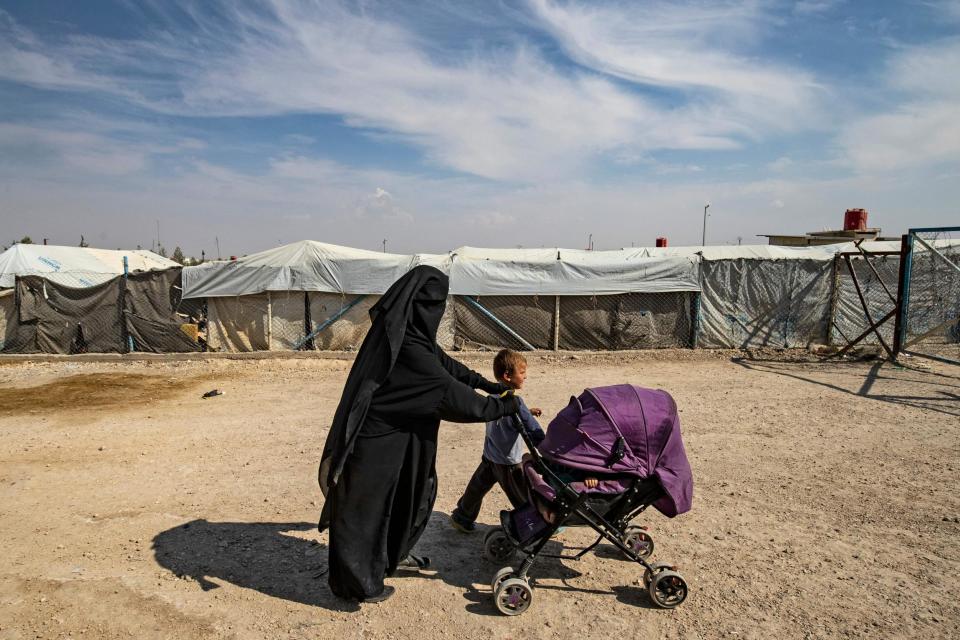British government condemned for offering to repatriate children from Syrian Isis camp but not their mother

Human rights campaigners have condemned the British government for reportedly agreeing to repatriate children from Syrian camps on the condition they are separated from their mother.
Relatives of Mehak Aslam, who joined Isis with her husband in 2014, want her to sign paperwork that would allow her four children to return to the UK on the condition that she does not come with them.
They are currently being held alongside other Isis families at a camp in Syria, while her husband Shahan Choudhury is being held in a prison nearby, ITV News reported.
A letter from the Foreign Office to the family said that if Ms Aslam “were to make a fresh request for her children to be repatriated without her, we would urgently investigate the practicalities of doing so”.
If the same offer is made to other British detainees, it could provide a route out of Syria for dozens of children.
But Maya Foa, director of the legal charity Reprieve, told The Independent amounted to family separation.
“The UK government has the choice to bring back mothers in northeast Syria together with their children and preserve family unity, something which child rights organisations all agree is in the best interests of the children,” she added.
“If the mothers have charges to answer, they can and should be prosecuted here in the UK by our justice system which deals with complicated cases every single day.”
The couple, from London, have been stripped of their British citizenship as part of controversial government attempts to prevent the return of alleged Isis members.
According to government documents, the deprivation of citizenship can only be used if it is “conducive to the public good” including for national security reasons.
Despite legal challenges, the government claims it can use the measure even if it makes a person stateless, as long as there are reasonable grounds to believe they can claim citizenship elsewhere.
The most recent figures show that 104 people were deprived of British citizenship in 2017.
Ms Aslam’s father, Mohammed, said his eldest granddaughter had been killed in an explosion in Isis’s last stronghold of Baghouz and he feared for her siblings’ safety amid the continuing war and dire conditions in camps.
“I can never forgive them for that,” he told ITV News. “They wanted to take this step for themselves. That’s fine, that’s their problem, but why involve the kids in this?”
He said it would be a “very hard thing” for Ms Aslam to be separated from her children but added: “I hope she will see the right side and realise this is in the best interests of the children.”
Relatives of Ms Aslam and Mr Choudhury approached the Foreign Office after seeing an interview with the husband on television last June.
The government announced late last year that a small number of orphans would be brought back from the UK but charities estimate that up to 60 British children remain in Syrian camps.
Addressing parliament in November, Dominic Raab said: “We have made it clear that we are willing to repatriate unaccompanied UK minors or orphans where is no risk to UK security.
“We would consider carefully individual requests for consular support more generally and subject to national security considerations, but of course the UK has no consular presence in Syria from which to provide assistance, and that makes it very difficult to help, but we respond on a case-by-case basis.”
The Independent understands that requests for assistance from families in Syria can be transmitted to the British government by friends and relatives in the first instance, as it has no consular presence in the country.
A spokesperson for the Foreign Office said it would not comment on individual cases, adding: “Every request for consular assistance is considered on a case by case basis.
“Decisions take into account all relevant considerations including nationality, national security and feasibility.“
Read more
Isis flag raised at Syrian camp holding jihadi families
Terrorists who self-radicalise ‘are bigger threat than Isis fighters’
There’s no way back for British Isis prisoners languishing in a Syrian
A camp holding thousands of Isis wives is close to breaking point

